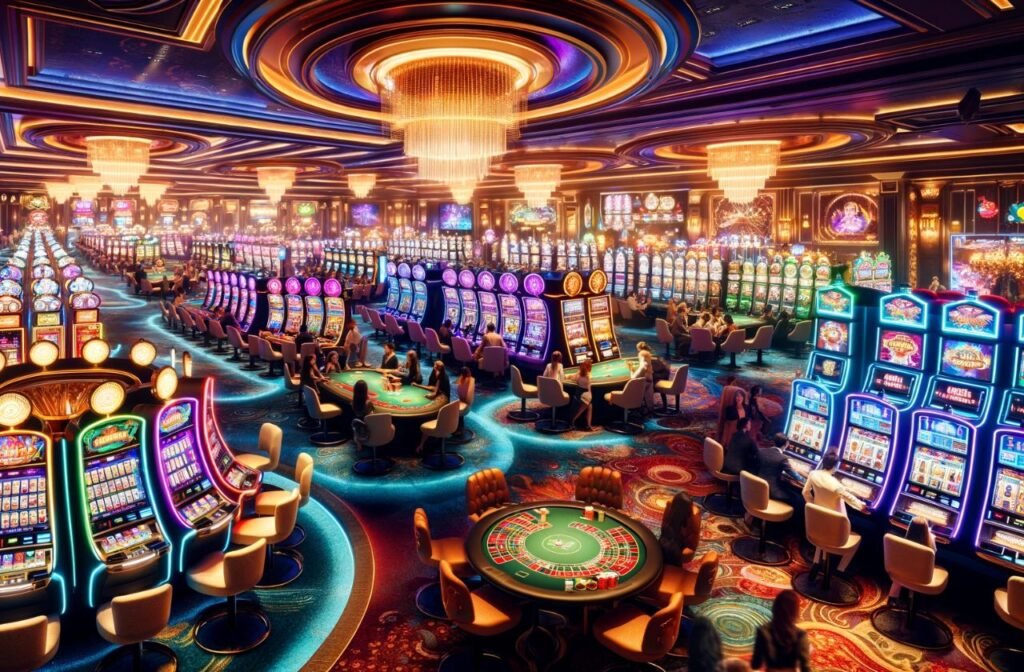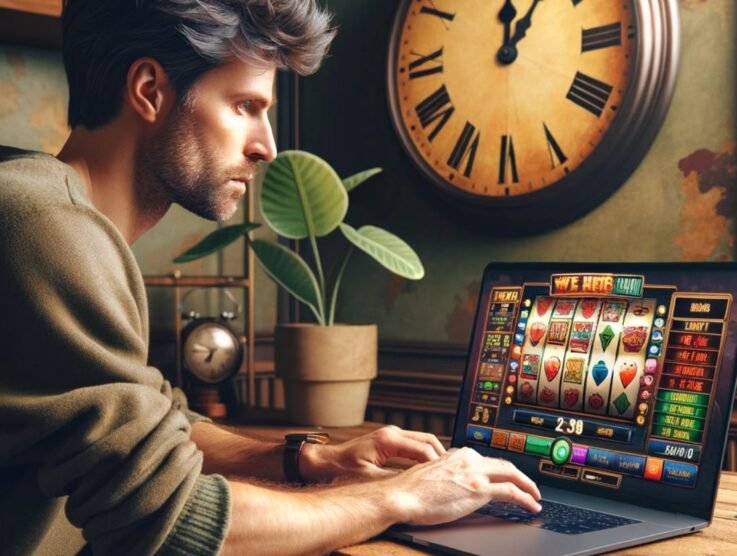Ever wondered what’s myth and what’s fact in casinos? We’re separating the truths from the tall tales in the gambling world. Read more!
Casino Myths Debunked: Unveiling the Truth Behind Gambling Lore

When it comes to casino gambling, there are numerous myths and misconceptions that often lead players astray. In order to separate fact from fiction, it is important to delve into the truth behind these commonly believed casino myths.
Here, we will debunk some of the most prevalent casino myths and provide factual information to dispel these misconceptions.
Key Takeaways
- Casino myths can mislead players and affect their decision-making.
- Understanding the true objectives of casino games is crucial for success.
- Players’ decisions in blackjack, such as the third base player’s actions, do not have a long-term impact.
- Gamblers should not rely on the belief that they are “due” for a win after a losing streak.
- Superstitions about changing tables or joining games mid-shoe have no influence on the outcome.
- Betting systems cannot overcome the house edge in casino games.
Myth 1: The Objective of Blackjack is to Get as Close as Possible to 21
One of the most common blackjack myths is the belief that the objective of the game is to get as close as possible to the number 21. However, this is a misconception that can lead to poor decision-making and potential losses. In reality, the true objective of blackjack is to beat the dealer by either having a higher final total than the dealer or not busting before the dealer busts.
Getting close to 21 is not the ultimate goal in blackjack. It is important for players to understand the primary objective of the game in order to employ effective playing strategies. Focusing solely on reaching 21 can lead to unnecessary risks and poor choices, such as hitting when it is not advisable or standing when it would be more advantageous to take another card.
Players should instead concentrate on making decisions that maximize their chances of beating the dealer. This may involve strategic choices like hitting, standing, doubling down, or splitting, depending on the player’s hand and the dealer’s up card. By understanding the true objective of blackjack and implementing sound strategies, players can increase their chances of success at the tables.
Myth 1: The objective of blackjack is to get as close as possible to 21.
| Common Misconception | Reality |
|---|---|
| The objective is to reach 21. | The objective is to beat the dealer by having a higher final total or not busting before the dealer. |
| Focus on getting 21 can lead to poor decision-making. | Strategic decision-making based on maximizing chances of beating the dealer is key. |
| May result in unnecessary risks. | Implementing effective playing strategies can enhance success. |
Myth 2: The Third Base Player is Killing Me
One of the enduring myths in blackjack is that the third base player, who is the last player to act before the dealer, has a significant impact on the outcome of the game. This belief stems from the perception that the third base player’s decisions can directly affect the subsequent cards dealt and ultimately influence whether the dealer wins or busts. However, this myth has been debunked by extensive mathematical analysis.
Research has shown that the decisions made by other players, including the third base player, do not have a long-term effect on a player’s expected outcome. Each card that is dealt in the game is determined by chance and the shuffle of the deck. The order of the cards is not influenced by the decisions of the players at the table.
“The belief that the third base player has control over the outcome of the game is a prime example of the gambler’s fallacy,” says Dr. John Johnson, a statistics professor at a renowned university. “The outcome of each hand is independent of previous results and is purely a matter of luck and the mathematics of probability.”
While it can be frustrating to witness a player make what seems like a poor decision, it is essential to remember that the outcome of each hand is determined by chance, and no individual player can significantly impact the overall results. By focusing on employing sound blackjack strategies and understanding the odds and probabilities involved, players can maximize their chances of success at the blackjack table.
Myth 3: I’m Due to Win
One of the most common misconceptions among gamblers is the belief that after a series of losses, they are due to win. This fallacy stems from a misunderstanding of probability. The outcome of each hand or spin in a casino game is independent of previous outcomes. Just because a player has experienced a losing streak does not mean that their chances of winning the next hand or spin are increased. Each event is separate and has its own set of probabilities. It is important for gamblers to understand that luck and probability are not influenced by past results.
This misconception can lead to the dangerous practice of chasing losses, where players continue to bet larger amounts in the hopes that they will eventually win back their losses. However, this is a flawed strategy that can result in even greater financial losses. The outcome of each game is determined by random chance and the underlying probabilities of the game itself. It is essential for gamblers to approach their play with a realistic understanding of the odds and the fact that winning or losing streaks are simply a natural part of the game.
To illustrate this point, consider the following hypothetical scenario. In a game of roulette, the probability of the ball landing on red or black is always approximately 50%. If a player experiences a losing streak where the ball lands on black multiple times in a row, it may be tempting to believe that the next spin is more likely to result in a red outcome. However, the reality is that each spin is an independent event with a 50% chance of landing on either color, regardless of previous outcomes. Understanding this concept is crucial for gamblers to make informed decisions and avoid falling into the trap of believing they are due to win.
| Common Gambling Misconceptions | Probability of Winning |
|---|---|
| I’m Due to Win | Each event is independent and has its own set of probabilities |
| The Gambler’s Fallacy | Past outcomes do not influence future results |
| Hot and Cold Streaks | Each game is governed by random chance and the underlying probabilities |
Myth 4: Changing Tables Can Impact the Order of Cards
When it comes to casino superstitions, one of the most common beliefs is that changing tables or joining a game in the middle of a shoe can somehow impact the order of the cards and potentially lead to losses. However, it’s important to note that this notion has no basis in reality and is purely a superstition.
The order of the cards in a shoe is determined by a random number generator or physical shuffling, both of which are independent of the players present at the table. Whether a player decides to switch tables or join a game midway through, it has no influence on the outcome of the game or the order in which the cards are dealt. It’s essential for players to recognize that such beliefs are unfounded and should not affect their decision-making.
“Changing tables or joining a game in the middle of a shoe has no impact on the order of the cards. It’s purely a superstition.”
To further debunk this myth, let’s take a closer look at the mechanics of the game. The order of the cards is predetermined before the dealer even starts dealing. The random number generator ensures fairness and unpredictability in the outcomes, while physical shuffling adds an additional layer of randomness. These processes are designed to eliminate any potential manipulation or bias.
So, the next time you find yourself tempted to switch tables or join a game in progress, remember that the order of the cards is beyond human control. Focus instead on making informed decisions based on the odds and probabilities of the game, rather than giving in to superstitions that have no impact on the outcome.
| Fact | Myth | |
|---|---|---|
| Belief | The order of cards is determined by a random number generator or physical shuffling. | Changing tables can impact the order of cards. |
| Explanation | The order of cards is predetermined before the dealer starts dealing, ensuring fairness and unpredictability. | The belief is a superstition and has no basis in reality. |
| Impact | Players can have confidence in the randomness of the game. | Players can avoid making decisions based on unfounded beliefs. |
Myth 5: Progressive Betting Systems Can Overcome the House Edge
Another commonly believed myth in the world of casino gambling is the notion that progressive betting systems can defy the inherent house edge. Many players are enticed by the idea that by adjusting their bets based on wins and losses, they can ultimately triumph over the odds. However, it is crucial to understand that betting systems do not alter the underlying mathematical advantage that the casino holds.
The house edge remains a long-term mathematical certainty, and no system can overcome it. While progressive betting systems may provide the illusion of control over one’s gambling outcomes, the reality is that they do not change the fundamental probabilities of the games. Relying on these systems can lead to misguided expectations and potential financial losses.
It is essential for players to approach betting systems with caution and to recognize that they cannot alter the ultimate outcome of casino games. The effectiveness of such systems is based on fallacious reasoning that ignores the mathematics and probabilities at play. Instead, it is wiser to focus on understanding the house edge, employing sound strategies, and practicing responsible gambling habits.
FAQ
What is the objective of blackjack?
The objective of blackjack is to beat the dealer by either having a higher final total than the dealer or not busting before the dealer busts. It is not simply about getting as close as possible to 21.
Does the third base player have a significant impact on the outcome of the game?
No, the decisions made by other players, including the third base player, do not have a long-term effect on a player’s expected outcome in blackjack. Each hand’s outcome is ultimately determined by chance and the cards dealt.
Does experiencing a series of losses increase the chances of winning in the next hand?
No, the outcome of each hand in a casino game is independent of previous outcomes. A losing streak does not mean that the chances of winning the next hand or spin are increased. Each event is separate and has its own set of probabilities.
Can changing tables impact the order of cards in a casino game?
No, changing tables or joining a game in the middle of a shoe has no influence on the order of the cards. The order is determined by a random number generator or physical shuffling. Such beliefs are unfounded superstitions.
Can progressive betting systems overcome the house edge?
No, no betting system can alter the underlying mathematical advantage that the casino holds. The house edge is a long-term mathematical certainty, and no system can overcome it. Betting systems should be approached with caution.







